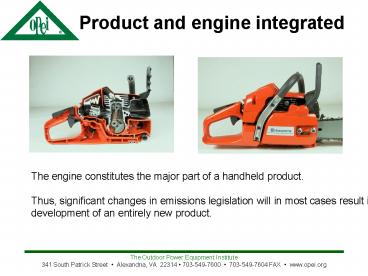The Outdoor Power Equipment Institute - PowerPoint PPT Presentation
1 / 10
Title:
The Outdoor Power Equipment Institute
Description:
The engine constitutes the major part of a handheld product. ... [Husqvarna ultimately pulled the product from the market] The Outdoor Power Equipment Institute ... – PowerPoint PPT presentation
Number of Views:86
Avg rating:3.0/5.0
Title: The Outdoor Power Equipment Institute
1
Product and engine integrated
The engine constitutes the major part of a
handheld product. Thus, significant changes in
emissions legislation will in most cases result
in development of an entirely new product.
2
1990 - 42cc Catalyst Equipped Chainsaw (Europe)
- Catalyst equipped chainsaw
- Developed for Nordic winter conditions
- Sold in Europe only
- High HC conversion
- High exhaust temperature
- Does not meet USFS heat requirements
- Heavy - adds 0.65 lb
- High cost - 30 cost increase
- Problems
- Heat and muffler temperature very high due to the
high HC conversion - Heat/Temperature control very difficult
- Exhaust system surfaces
- Exhaust gas
- Surrounding components
- Safety issues not satisfactory for all climatic
conditions - Husqvarna ultimately pulled the product from the
market
3
Line Trimmer
Spark Screen
Chainsaw
High Conversion Catalyst
4
Catalyst Issues
- Heat generation and gas/surface temperatures
difficult but important to control - Due to heat issues, HC conversion rates must be
reduced with increased displacement and power - Restricted oxygen content in the exhaust (phase 1
type engines) means a built-in limitation of the
HC conversion - Restricts heat and temperature
- Potentially higher CO levels
- Higher oxygen content in the exhaust (phase 2
type engines), e.g. due to redesigned scavenging
systems or secondary air supply - Higher, more unpredictable HC and CO conversion
- Risk for higher gas and surface temperatures
5
Catalyst issues
- Heat effect on surrounding components
- User contact with hot surfaces
- Exhaust system legislation, such as USFS
- Performance issues associated with heat transfer
into the engine and carburetor from a higher
muffler temperature hot soak issues. - Climatic and usage conditions
6
Catalyst Heat35 cc engine, scav. loss 12, A/F 11
Additional Exhaust Temperature as function of
Catalyst HC conversion
350
300
250
200
Temperature increase F
150
100
50
0
0
5
10
15
20
25
30
35
40
HC Conversion
7
Handheld Product Lessons for Non-Handheld Products
- The much larger non-handheld engines already
generate greater overall heat and greater heat
density compared to smaller handheld engines. - Dramatically larger and hotter catalysts would be
required to convert the greater mass of HC and
NOx emitted from larger non-handheld engines. - Handheld engines, due to their low CO levels, did
not have the extra heat generation resulting from
the conversion of CO - The larger the displacement and higher the
horsepower, the lower the catalyst conversion
rate must be to prevent excessive temperature
issues.
8
Handheld Product Lessons for Non-Handheld Products
- With the difficulties in adapting catalytic
technology to a fully integrated product such as
chainsaws or line trimmers, non-integrated
adaptation will be even more difficult - Engine and equipment manufacturer typically not
the same - In many wheeled applications, heat mitigation
strategies implemented by integrated handheld
manufacturers will not be available (ex.,
redirecting cooling air from around engine into
exhaust system). - Engine fitted in a narrow engine compartment
close to surrounding surfaces and functions
9
Handheld Product Lessons for Non-Handheld Products
- Routine maintenance no longer routine!
- Failure by the operator to perform maintenance as
instructed in the Owners/Operators Manual can
overwork the catalyst. Surrounding components
(i.e., fuel tank, etc.) exposed to excessive
heat. - Significantly greater efforts are required in
design and integration to assure product safety.
10
Handheld Product Lessons for Non-Handheld Products
- With engine displacements from 16cc 120cc,
handheld products have realized that product must
be developed with catalyst in mind from the
beginning of the design process. - It is not a drop-in technology.































